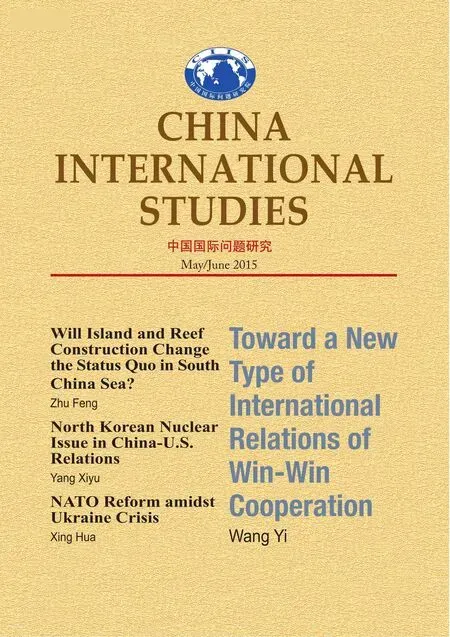To Know and Understand China: Applying Multiple Perspectives
2015-02-09□
□
To Know and Understand China: Applying Multiple Perspectives
□Lu Jing
In the building of China’s national image, international opinions play a particularly important role. Given that a country influences international opinion to a large extent through the “stories” it tells, we should try to tell “China stories” to help the world better understand China. In the era of global informationalization, global support hinges on who wins public endorsement through their stories; on the other hand, the international society also needs to objectively understand China as any “misreading” will not only hinder China’s development, but also bring negative effects on the world’s development. Hence, this paper outlines four perspectives from which to view China, in the hope that the international society can better know and understand China from multiple perspectives.
Seeing China from a Historical Perspective
China’s diplomatic philosophy has evolved from traditional Chinese culture. In its 5,000-year history, the Chinese nation has developed ideals such as“coordination and cooperation among all nations” and “all countries are part of one family”, and developed ideas as “peace is of paramount importance”and “peace in diversity”. It has also acquired a profound understanding of the proverb, “a bellicose country is doomed to decease even if it is powerful”.For a long time, China pursued a tributary system, which was established in the Qin and Han dynasties (221 BC-AD 220). This reflected the hierarchical concept of order in Chinese traditional philosophy, characterized by an“orderly hierarchy between superiors and inferiors and among people with higher and lower ranks”, and strictly held a cautious attitude to use of force and executed the rule of rites with “benevolence” as the core.

However, the intrusion of modern Western civilization brought an end to China’s imperial “rule of rites” and the country was forcibly dragged into the modern nation state system, in which sovereignty is regarded as the top priority. However, China’s sovereignty was damaged and it experienced painful humiliation as a result of this encounter. The hundred years of humiliation drove home the feeling to China that once a country forfeits its sovereignty, its people will be deprived of dignity and status. After the founding of New China, the country has resolutely defended its hard-won sovereignty and territorial integrity and allowed no foreign interference. At the same time, China has also paid respect to the sovereignty and territorial integrity of other countries.
In the 60-plus years of diplomatic practice after the founding of the People’s Republic of China, the Chinese government has conceptualized a series of significant diplomatic policy proposals and strategic thoughts. TheFive Principles of Peaceful Coexistence, in particular, still remains the core of China’s diplomatic thinking and its guidelines for practical policies. China has never compromised on issues concerning sovereignty and never succumbed to hegemony even at a time when its national strength was still very weak. Today’s China has increased its national strength, but the “do to others as you would like have them do to you” philosophy, which was profoundly learned from its painful history, has become the cherished creed of the Chinese people. While defending its sovereignty, China will also inevitably respect the sovereignty of others.
Observing China from a Spatial Perspective
China is a big country as well as the biggest developing country. As a world power, China is both an important force for world peace and stability and the major driver of the world’s economic development. China has to undertake its responsibilities as a big country and develop the awareness of the need to shoulder its responsibilities. Nevertheless, as a developing country, China is still confronted with arduous difficulties in its domestic development and still needs to regard development as the top priority.
Its “double identity” as a world power and the biggest developing country calls for China to find a balance between undertaking its global responsibilities and pursuing self-development. Hence, to build a new model of international relations with cooperation and win-win fruits at the core is China’s inevitable strategic choice. China is also a regional power in Asia. Asia is the most diversified and pluralistic continent. There are a variety of races, diversified religions and pluralistic cultures in the region, which, together with their different political systems, varying economic development levels and historical factors, has led to numerous discrepancies and even disputes among Asian countries in terms of their values and interests. This is reflected in the ties between China and its neighbors.
China’s rise has intensified the already complicated disputes with surrounding countries concerning historical issues, sovereignty over some territories, as wellas maritime rights and interests. Increased inputs into East Asia by the world’s major powers based on their global strategic considerations have further complicated the geopolitical challenges China faces. All these factors determine the urgent and arduous nature of China’s efforts to maintain a peaceful and stable surrounding environment. To develop smooth ties with surrounding countries will lay a foundation for China’s survival, development and prosperity, and thus China is devoted to playing a major role in advancing regional development and maintaining regional peace, goals that not only serve China’s interests but also embody its responsibilities.
Its “double identity” as a world power and the biggest developing country calls for China to find a balance between undertaking its global responsibilities and pursuing self-development.
China is a socialist country and socialism is a historical choice made by the Chinese people. However, due to various factors, the West holds is suspicious of and even hostile toward socialism. The end of the Cold War did not put an end to the ideological differences between the East and West, instead it made the ideological struggle between capitalism and socialism more extensive and more complicated. As a result, a rising China is confronted with an “ideological trap” in numerous fields. Consequently, its status as a big country, its characteristics as a developing country, as well as its socialist system have plunged China into the “troubles of growth” and to create a peaceful and amicable international environment is thus an important task now facing China.
Understanding the Changes in China’s Ties with the World from the Perspective of Practice
Practice is an essential character of mankind’s social activities. To view practice as the basis and starting point of observing and thinking about all natural, social and thinking phenomena is the essence of Marxist practical philosophy. China is changing itself and influencing the world in the process of twoway interactions with the international system. Since the launch of reformand opening-up, China has been actively participating in the international system with an open posture, not only economically integrating itself to the West-dominated global economic system in a comprehensive and deepened manner, but also increasingly participating in international political, security, social and cultural systems. In this process, China has elevated its international status by taking advantage of the systematic channels of the extant international order.
At the same time, China has also consistently adhered to an independent diplomatic route of peace and made important contributions to regional and world peace and stability. It is because of such two-way interactions between China and the international system that China has become an active participant, builder and contributor of the extant international system. The admission of China into the global system has also made the international system more open, legitimate, facilitating its selfdevelopment in a tolerant direction.
The admission of China into the global system has also made the international system more open, legitimate, facilitating its selfdevelopment in a tolerant direction.
Seeing China from China’s Angle
To put oneself in someone else’s shoes is the basis for exchanges among different peoples and also the foundation for good state-to-state relations. David M. Lampton, a famous US expert on China, often reminds students of learning to put themselves in China’s position before looking at its domestic and foreign policies and considering its problems. The students may not like China’s policies, or they may disapprove of its values, but they must realize that the Chinese are a rational people. They should realize that the Chinese government makes policies based on its own logic and therefore they should try to determine what that logic is. Michael Pillsbury, a senior research fellow at the US Hudson Institute also pointed out that “the problem of misreading China does not lie in China but lies in ourselves”, “over the past 60-oddyears, Westerners have always treated China from the perspective of our own interests”, “after 65 years, we do not know what China wants, because we have never really kept an attentive ear to the strong voice opposite to our wishful thinking”.1Michael Pillsbury, “Misunderstanding China,” Hudson Institute, October 17, 2014, http://www.hudson. org/research/10623-misunderstanding-china.
“After 65 years, we do not
know what China wants,
because we have never really kept an attentive ear to the strong voice opposite to our wishful thinking.”
David M. Lampton noted that if the United States always uses its own values and system as the yardstick by which to measure China, how can Americans expect to understand China with its completely different history, cultures and ethnicity?
However, this is a two-way street and Chinese people also need to calmly face up to the outside world’s critical opinions.“China is a big country with a 1.3 billion-strong population, like a big man in the middle of a crowd, so people will care how he will go and whether he will run into them or block their way or occupy their domain”.2Chinese President Xi Jinping delivered a speech at the Federal Parliament of Australia in Canberra, capital of Australia on November 17, 2014.Therefore, to experience and reflect on problems from somebody else’s perspective offers a cornerstone for enhancing mutual understanding and trust.
The concurrence of multiple transformations that China is undergoing and the profound transformation the international system is experiencing has brought profound changes to China’s relations with the outside world. Such a double transformation has not only increased the difficulties for mutual knowing, but has also highlighted the importance of mutual understanding.
We believe that mutual understanding is the necessary foundation for promoting the development of relations. The more we mutually learn from and understand one another, the firmer and broader will be our exchanges and cooperation.
Lu Jingis Professor of China Foreign Affairs University. This article is extracted from her thesis “China’s Peaceful Rise: An Analysis of International Public Opinion Environment,” which was published in ChineselanguageInternational Studies,Issue 2, 2015.
杂志排行
China International Studies的其它文章
- CIIS Co-hosts International Conference on China-Japan-South Korea Security Cooperation
- Ten Trends of the Information Economy
- United States: On Threshold of UNCLOS
- NATO Reform amidst Ukraine Crisis
- Proactive Pacifism: A Blessing for the Japan-US Alliance?
- North Korean Nuclear Issue in China-U.S. Relations
